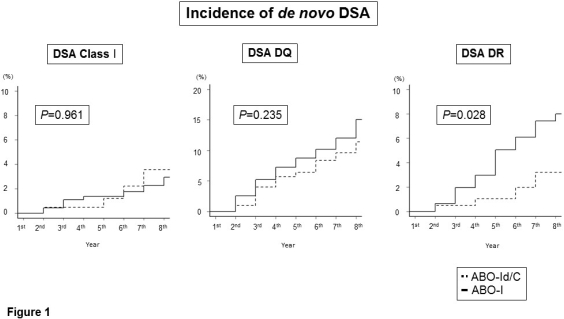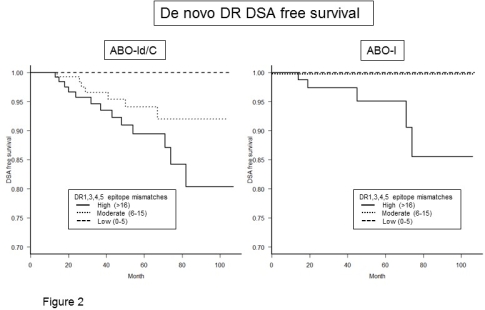Lower Incidence of De Novo Donor-Specific Antibodies against HLA-DR in ABO-Incompatible Renal Transplantation
1Department of Transplant and Endocrine Surgery, Nagoya Daini Red Cross Hospital, Nagoya, Japan
2Department of Transplant Surgery, Aichi Medical University, Nagakute, Japan.
Meeting: 2018 American Transplant Congress
Abstract number: C21
Keywords: Antibodies, Epitopes, HLA antibodies, Kidney transplantation
Session Information
Session Name: Poster Session C: Kidney Chronic Antibody Mediated Rejection
Session Type: Poster Session
Date: Monday, June 4, 2018
Session Time: 6:00pm-7:00pm
 Presentation Time: 6:00pm-7:00pm
Presentation Time: 6:00pm-7:00pm
Location: Hall 4EF
Introduction
De novo DSA-induced chronic antibody-mediated rejection (AMR) is one of major obstacles to long term graft survival. We have reported that anti-A/B antibody binding could cause graft accommodation, which demonstrated protective effects against graft injury due to upregulation of complement regulatory proteins (CD55/CD59) and downregulation of HLA class II antigens. The purpose of this study was to elucidate the effect of ABO incompatibility on de novo DSA production after kidney transplantation.
Methods
Annual screening tests for de novo DSA were performed in 682 living donor kidney transplantations [467 ABO-identical/compatible (ABO-Id/C), 215 ABO-I] performed between 2005 and 2014. Diagnostic biopsy was conducted in 54 patients (11 ABO-I and 43 ABO-Id/C) after de novo DSA was detected.
Results
DSA was detected in 96 of 682 patients. The incidence of DR-associated de novo DSA was significantly lower in ABO-I than in ABO-Id/C (P = 0.024) patients. Biopsy-proven chronic AMR was lower in ABO-I than in ABO-Id/C (27.3% [3/11] vs. 44.2% [19/43]) patients. When epitope mismatch levels were divided into low, moderate and high, de novo DR DSA free graft survivals with moderate mismatch levels were higher in ABO-I than in ABO-Id/C.

Conclusions
A lower incidence of de novo DR-associated DSA was observed in ABO-I patients, who may be less vulnerable to DSA-mediated chronic AMR. It is suggested that graft accommodation in ABO-I patients could exhibit a protective effect against not only anti-A/B antibody- but also de novo DSA-induced graft injury.
CITATION INFORMATION: Okada M., Futamura K., Hiramitsu T., Tsujita M., Goto N., Narumi S., Watarai Y., Iwasaki K., Kobayashi T. Lower Incidence of De Novo Donor-Specific Antibodies against HLA-DR in ABO-Incompatible Renal Transplantation Am J Transplant. 2017;17 (suppl 3).
To cite this abstract in AMA style:
Okada M, Futamura K, Hiramitsu T, Tsujita M, Goto N, Narumi S, Watarai Y, Iwasaki K, Kobayashi T. Lower Incidence of De Novo Donor-Specific Antibodies against HLA-DR in ABO-Incompatible Renal Transplantation [abstract]. https://atcmeetingabstracts.com/abstract/lower-incidence-of-de-novo-donor-specific-antibodies-against-hla-dr-in-abo-incompatible-renal-transplantation/. Accessed February 23, 2026.« Back to 2018 American Transplant Congress
